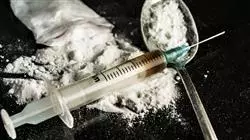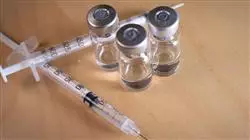University certificate
The world's largest faculty of medicine”
Introduction to the Program
Take your education a step further by understanding the effects of heroin and morphine on the brain of addiction patients"

This Postgraduate certificate is unique in that it offers the physician a multitude of techniques and tools to intervene in various types of addictions. Specifically, those involving morphine and heroin. Aimed at professionals who wish to specialize in this field, or who want to update their knowledge in this regard, the program offers the latest advances in this area based on the positive effects of the cognitive-behavioral approach.
In this way, the program covers heroin and morphine addiction as one of the fields that physicians will have to deal with most in their daily practice. This will help them to position and orient themselves in the intervention in a realistic and committed way, knowing the role they must play in the intervention together with other professionals and knowing how to apply the most appropriate techniques for each moment of the intervention process.
The teaching team of this program has made a careful selection of each of the topics of this program in order to offer the student the most complete study opportunity possible and always linked to current events.
As it is an online Postgraduate certificate, the student is not constrained by fixed schedules or the need to move to another physical location, but rather, they can access the contents at any time of the day, allowing them to balance their professional or personal life with their academic life as they please.
Thanks to this Postgraduate certificate you will learn how to approach heroin and morphine addictions from a new perspective based on cognitive-behavioral psychology"
This Postgraduate certificate in Cognitive-Behavioral Intervention in Heroin and Morphine Addiction contains the most complete and up-to-date scientific program on the market. The most important features include:
- Development of clinical cases presented by medical experts
- The graphic, schematic, and practical contents with which they are created, provide scientific and practical information on the disciplines that are essential for professional practice
- New developments in the diagnostic and therapeutic performance in Cognitive-Behavioral Intervention in Heroin and Morphine Addiction
- An algorithm-based interactive learning system for decision-making in the clinical situations presented throughout the course
- With a special emphasis on evidence-based medicine and research methodologies in emergencies
- All of this will be complemented by theoretical lessons, questions to the expert, debate forums on controversial topics, and individual reflection assignments
- Content that is accessible from any fixed or portable device with an Internet connection
You will be able to study comfortably, without the need for traveling or schedules. You will be the one who sets the pace of your studies"
It includes, in its teaching staff, health professionals belonging to the field of Cognitive-Behavioral Intervention in Heroin and Morphine Addiction, who bring to this program their work experience, in addition to recognized specialists belonging to scientific societies of reference.
Thanks to its multimedia content developed with the latest educational technology, they will allow the professional a situated and contextual learning, that is to say, a simulated environment that will provide an immersive learning programmed to prepare in
real situations.
This program is designed around Problem-Based Learning, whereby the physician must try to solve the different professional practice situations that arise during the course. For this purpose, they will be assisted by an innovative, interactive video system created by renowned and experienced experts in the field of Cognitive-Behavioral Intervention in Heroin and Morphine Addiction with extensive teaching experience.
The Postgraduate certificate includes real clinical cases and exercises to bring the content of the program closer to the clinical practice of a physician"

Addiction is a complex and profound public health problem. It is therefore crucial for physicians to update their knowledge in this field in order to offer quality education adapted to current standards"
Why study at TECH?
TECH is the world’s largest online university. With an impressive catalog of more than 14,000 university programs available in 11 languages, it is positioned as a leader in employability, with a 99% job placement rate. In addition, it relies on an enormous faculty of more than 6,000 professors of the highest international renown.

Study at the world's largest online university and guarantee your professional success. The future starts at TECH”
The world’s best online university according to FORBES
The prestigious Forbes magazine, specialized in business and finance, has highlighted TECH as “the world's best online university” This is what they have recently stated in an article in their digital edition in which they echo the success story of this institution, “thanks to the academic offer it provides, the selection of its teaching staff, and an innovative learning method aimed at educating the professionals of the future”
A revolutionary study method, a cutting-edge faculty and a practical focus: the key to TECH's success.
The most complete study plans on the university scene
TECH offers the most complete study plans on the university scene, with syllabuses that cover fundamental concepts and, at the same time, the main scientific advances in their specific scientific areas. In addition, these programs are continuously being updated to guarantee students the academic vanguard and the most in-demand professional skills. In this way, the university's qualifications provide its graduates with a significant advantage to propel their careers to success.
TECH offers the most comprehensive and intensive study plans on the current university scene.
A world-class teaching staff
TECH's teaching staff is made up of more than 6,000 professors with the highest international recognition. Professors, researchers and top executives of multinational companies, including Isaiah Covington, performance coach of the Boston Celtics; Magda Romanska, principal investigator at Harvard MetaLAB; Ignacio Wistumba, chairman of the department of translational molecular pathology at MD Anderson Cancer Center; and D.W. Pine, creative director of TIME magazine, among others.
Internationally renowned experts, specialized in different branches of Health, Technology, Communication and Business, form part of the TECH faculty.
A unique learning method
TECH is the first university to use Relearning in all its programs. It is the best online learning methodology, accredited with international teaching quality certifications, provided by prestigious educational agencies. In addition, this disruptive educational model is complemented with the “Case Method”, thereby setting up a unique online teaching strategy. Innovative teaching resources are also implemented, including detailed videos, infographics and interactive summaries.
TECH combines Relearning and the Case Method in all its university programs to guarantee excellent theoretical and practical learning, studying whenever and wherever you want.
The world's largest online university
TECH is the world’s largest online university. We are the largest educational institution, with the best and widest online educational catalog, one hundred percent online and covering the vast majority of areas of knowledge. We offer a large selection of our own degrees and accredited online undergraduate and postgraduate degrees. In total, more than 14,000 university degrees, in eleven different languages, make us the largest educational largest in the world.
TECH has the world's most extensive catalog of academic and official programs, available in more than 11 languages.
Google Premier Partner
The American technology giant has awarded TECH the Google Google Premier Partner badge. This award, which is only available to 3% of the world's companies, highlights the efficient, flexible and tailored experience that this university provides to students. The recognition as a Google Premier Partner not only accredits the maximum rigor, performance and investment in TECH's digital infrastructures, but also places this university as one of the world's leading technology companies.
Google has positioned TECH in the top 3% of the world's most important technology companies by awarding it its Google Premier Partner badge.
The official online university of the NBA
TECH is the official online university of the NBA. Thanks to our agreement with the biggest league in basketball, we offer our students exclusive university programs, as well as a wide variety of educational resources focused on the business of the league and other areas of the sports industry. Each program is made up of a uniquely designed syllabus and features exceptional guest hosts: professionals with a distinguished sports background who will offer their expertise on the most relevant topics.
TECH has been selected by the NBA, the world's top basketball league, as its official online university.
The top-rated university by its students
Students have positioned TECH as the world's top-rated university on the main review websites, with a highest rating of 4.9 out of 5, obtained from more than 1,000 reviews. These results consolidate TECH as the benchmark university institution at an international level, reflecting the excellence and positive impact of its educational model.” reflecting the excellence and positive impact of its educational model.”
TECH is the world’s top-rated university by its students.
Leaders in employability
TECH has managed to become the leading university in employability. 99% of its students obtain jobs in the academic field they have studied, within one year of completing any of the university's programs. A similar number achieve immediate career enhancement. All this thanks to a study methodology that bases its effectiveness on the acquisition of practical skills, which are absolutely necessary for professional development.
99% of TECH graduates find a job within a year of completing their studies.
Postgraduate Certificate in Cognitive-Behavioral Intervention in Heroin and Morphine Addiction
.
Heroin and morphine addiction are public health issues affecting millions of people worldwide. Nowadays, the demand for professionals specialized in the treatment of opioid addiction is increasing. Therefore, the Postgraduate Certificate in Cognitive-Behavioral Intervention of Heroin and Morphine Addiction is a unique opportunity to enrich your knowledge and excel in this field. In this 100% online program, you will have access to updated and specialized materials on the classification of opiates and opioids, forms of consumption, impact and effects on health, neurobiology of addiction, opiate-related disorders, psychological assessment, pharmacological treatment, psychological treatment, other therapeutic interventions, psychosocial intervention with special populations, approaching other pathologies present in addiction and relapse prevention and maintenance.
You will configure the specialized professional background you want
.
Cognitive-behavioral treatment is one of the most effective techniques in the treatment of opioid addiction. With this course, you will be able to acquire skills needed to implement this technique and help your patients overcome their addiction. In addition, you will learn about psychological assessment in opioid addiction and the importance of pharmacological treatment in the management of withdrawal symptoms. You will also delve into other therapeutic interventions and types of intervention programs that you can implement in your daily practice. Indeed, this Postgraduate Certificate in Cognitive-Behavioral Intervention for Heroin and Morphine Addiction is an excellent choice for those who wish to specialize in the treatment of opioid addiction and acquire skills needed to help their patients overcome their addiction. Don't miss the opportunity to enroll and expand your knowledge from the comfort of your home!







